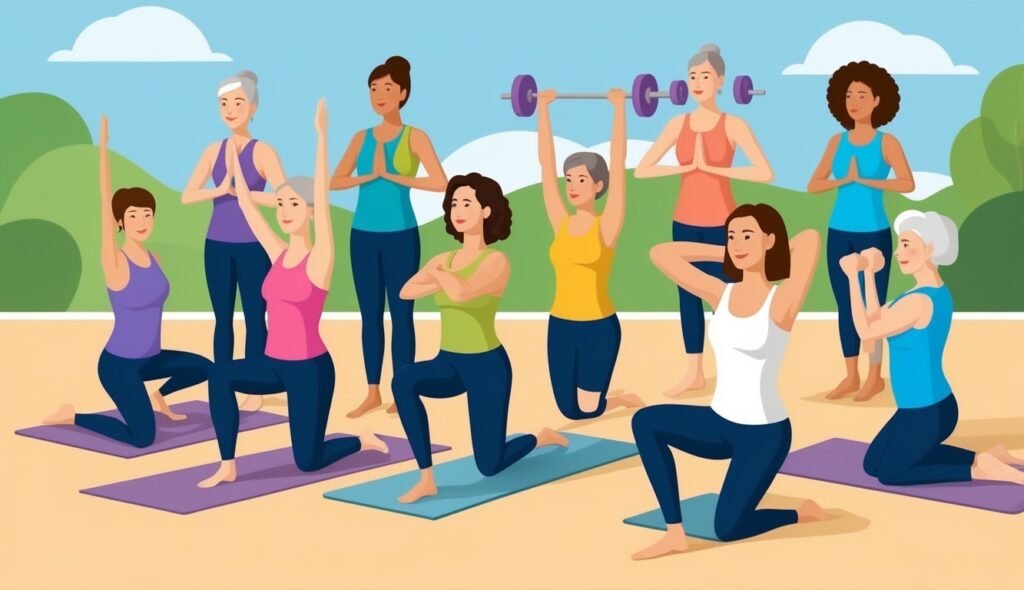As we navigate through the changes that come with menopause, it’s important to pay attention to our bone health.
Many women experience a decline in bone density during this time, making it crucial to adopt practices that can support our skeletal strength.
Simple, everyday solutions can make a significant difference in maintaining bone health after menopause.
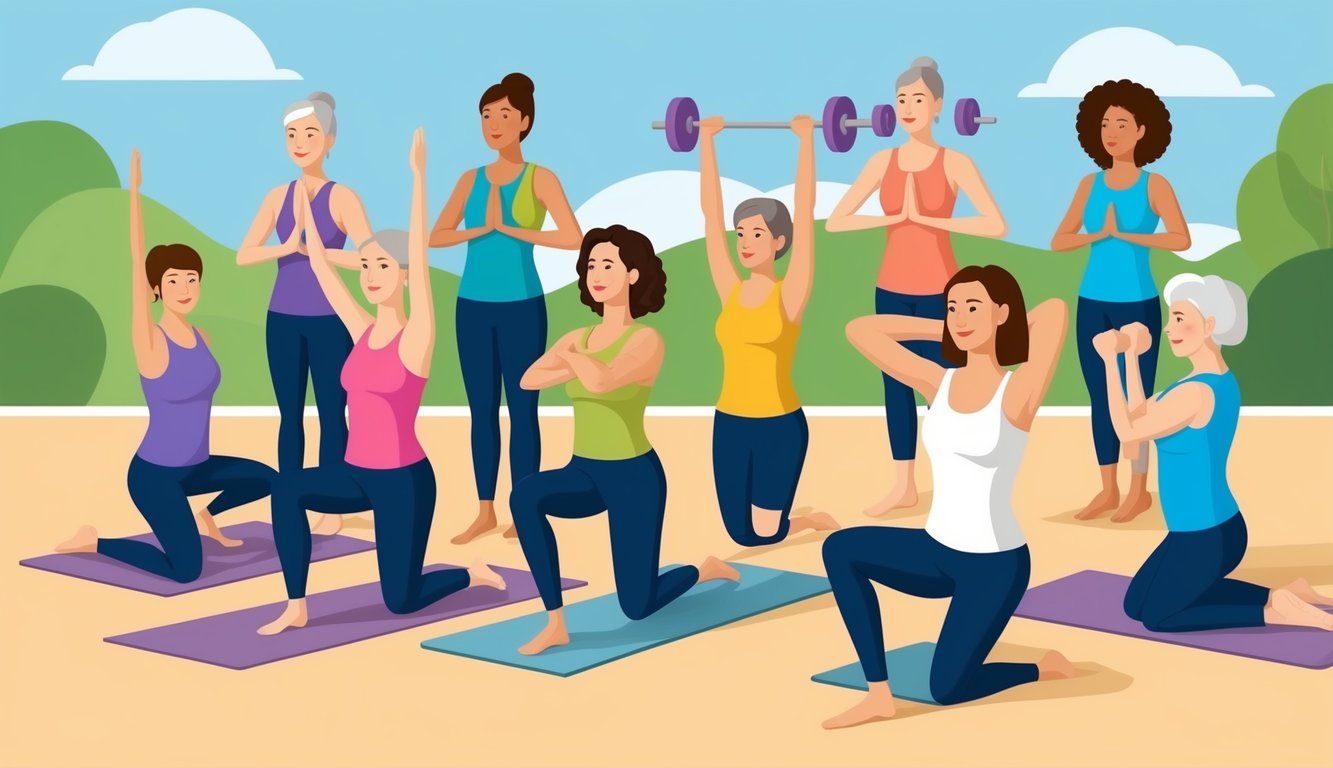
Various strategies can help reinforce our bones and keep them strong.
From nutrition to physical activity, these solutions aren’t just beneficial; they’re also easy to incorporate into our daily routines.
By embracing these practices, I can take proactive steps toward a healthier future.
1) Calcium-rich Foods
When I think about bone health, I immediately consider calcium-rich foods.
They play a crucial role in helping to maintain strong bones, especially for postmenopausal women.
Dairy products like yogurt and cheese are classic sources of calcium.
If I’m looking for plant-based options, I turn to tofu, almonds, and plant milks that are fortified with calcium.
I’ve also learned that canned salmon is not only delicious but packed with calcium too.
Another great choice is white beans, which are versatile and can be added to various dishes.
Dried figs and prunes are surprising sources that I enjoy as snacks.
They’re not just tasty; they can also help boost my bone health.
It’s essential to select foods that not only provide calcium but also promote its absorption.
Including vitamin D sources like fortified foods or getting some sunshine can enhance my body’s ability to use this vital mineral effectively.
Vitamin D Supplements
Vitamin D plays a crucial role in maintaining bone health, especially for postmenopausal women.
After menopause, the body may struggle to absorb calcium effectively, making vitamin D supplementation beneficial.
I focus on getting enough vitamin D from both sun exposure and dietary sources.
Not everyone gets enough sunlight, especially in winter months, so supplements can help fill that gap.
There are various forms of vitamin D supplements available—D2 and D3 being the most common.
I prefer D3 due to its higher potency and better absorption in the body.
While trying to determine the right dosage, I find that individuals may have different needs based on their lifestyle and health.
It’s a good idea to consult with a healthcare provider about this.
I always check the labels for quality and assurance from reputable brands.
This ensures I’m getting a supplement that’s both effective and safe.
Regularly monitoring my vitamin D levels can also help in adjusting my intake as needed.
Weight-bearing Exercises
I’ve learned that weight-bearing exercises are crucial for maintaining bone health, especially for postmenopausal women.
These exercises help stimulate bone formation and can combat the effects of osteoporosis.
Simple activities like walking, jogging, or dancing can make a significant difference.
I find that even gardening can be an effective way to incorporate movement while providing weight-bearing benefits.
More structured workouts can include exercises like weightlifting, where using free weights or resistance bands adds extra load.
Just 30 minutes of moderate to heavy weight training a couple of times a week can promote noticeable improvements in bone density.
Even activities like climbing stairs or playing tennis can be great choices.
They not only help strengthen bones but also improve balance to reduce the risk of falls.
If you’re just starting, I recommend consulting a healthcare provider or a fitness professional.
They can help design a personal plan that meets your needs and ensures safety while getting stronger.
4) Balanced Diet

Eating a balanced diet is crucial for supporting bone health, especially during and after menopause.
I focus on incorporating a variety of foods that provide essential nutrients.
My meals include plenty of vegetables and fruits.
These foods are rich in vitamins and minerals that help strengthen bones.
Whole grains, seeds, and nuts are also must-haves in my pantry; they contribute healthy fats and additional nutrients.
I pay close attention to calcium intake since it’s vital for bone density.
Dairy products are an excellent source, but I also enjoy fortified plant-based alternatives.
Tofu is another favorite of mine as it’s high in both calcium and protein.
I’ve found that including fatty fish like salmon in my diet helps boost vitamin D levels.
This vitamin is essential for calcium absorption.
Lastly, I make sure to limit processed foods and sugars since they can negatively impact my overall bone health.
5) Healthy Lifestyle Choices

Maintaining bone health is essential, especially after menopause.
I’ve found that simple lifestyle changes can make a big difference.
First, a balanced diet is key.
I focus on eating calcium-rich foods like yogurt, leafy greens, and almonds.
This helps support bone density.
I also pay attention to vitamin D intake.
It aids calcium absorption, so I make sure to include fatty fish and fortified products in my meals.
Exercise is another vital component.
I try to incorporate weight-bearing activities like walking and strength training.
This keeps my bones strong and enhances overall fitness.
Lastly, I work on preventing falls around my home.
Small adjustments like keeping areas well-lit and using non-slip mats can help me stay safe and reduce injury risks.
Adequate Sleep

Getting enough sleep is crucial for maintaining strong bones, especially during and after menopause.
I’ve learned that sleep impacts bone health more than I initially realized.
Research shows a connection between short sleep duration and low bone mineral density in postmenopausal women.
If I consistently get less sleep, it might hinder my body’s ability to maintain healthy bones.
Quality sleep helps my body repair and recover.
Sleep supports the hormonal balance that plays a role in bone density.
When I’m well-rested, I feel better overall, which can motivate me to stay active.
To improve my sleep, I try to establish a routine.
Going to bed at the same time each night and creating a relaxing environment makes a difference.
Reducing caffeine and screen time before bed also helps me drift off more easily.
I’ve noticed that when I prioritize sleep, I feel more energized and ready to take on activities that support my bone health.
Making sleep a priority is just one step I can take toward better bone health during this stage of life.
7) Nutrient-rich Vegetables

Including nutrient-rich vegetables in my diet is one of the simplest ways to support bone health.
Leafy greens like kale and spinach are packed with calcium and vitamin K, which are essential for keeping bones strong.
I also find that cruciferous vegetables, such as broccoli and Brussels sprouts, offer great benefits.
They provide a range of vitamins and minerals while being low in calories.
Plus, they are easy to add to meals.
Colorful veggies like bell peppers and carrots are not just tasty; they bring antioxidants that help reduce oxidative stress on bones.
This is particularly important for postmenopausal women, as bone density can decrease after menopause.
I often include a variety of these vegetables in my meals, from salads to stir-fries.
Not only do they contribute to my bone health, but they also keep my meals vibrant and enjoyable.
Eating a rich array of vegetables is not only nourishing but also a delicious way to support my bones.
8) Strength Training
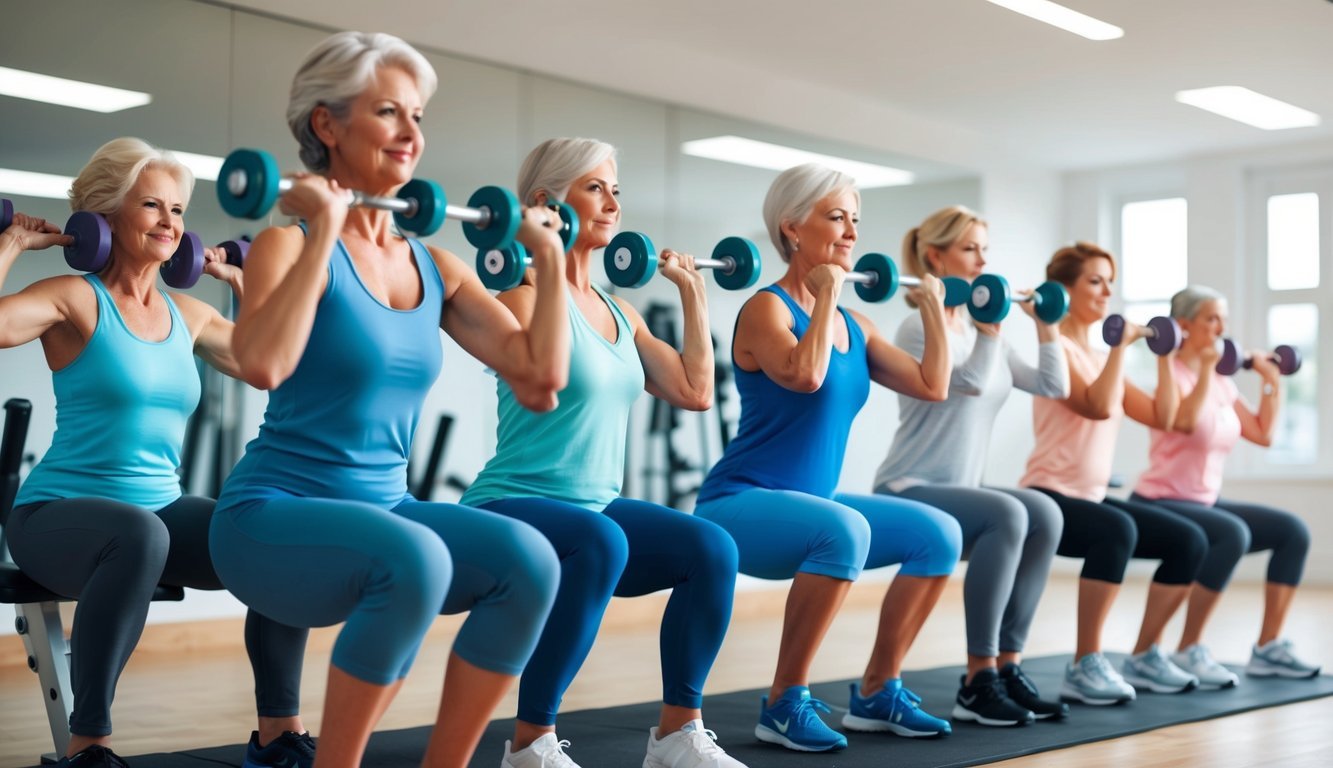
Strength training is a game changer for bone health, especially for postmenopausal women.
I’ve learned that it helps build and maintain bone density, which is crucial as we age.
Using weights or resistance bands can make a real difference.
I often do exercises like squats, lunges, and deadlifts, as they target multiple muscle groups and put strain on the bones.
This process stimulates bone growth and keeps them strong.
I find that combining strength training with weight-bearing activities like brisk walking or jogging enhances the benefits.
It’s not just about lifting heavy; even lighter weights can have a significant impact if done consistently.
It’s important to start at a comfortable level and gradually increase intensity.
I’ve discovered that working with a trainer or following a structured program helps me stay motivated and use proper form.
Plus, it can be a fun way to socialize!
Incorporating strength training into my routine not only boosts my bone health but also improves my overall strength and balance.
I feel more confident moving through my day, and that’s a win for me!
9) Regular Bone Density Tests
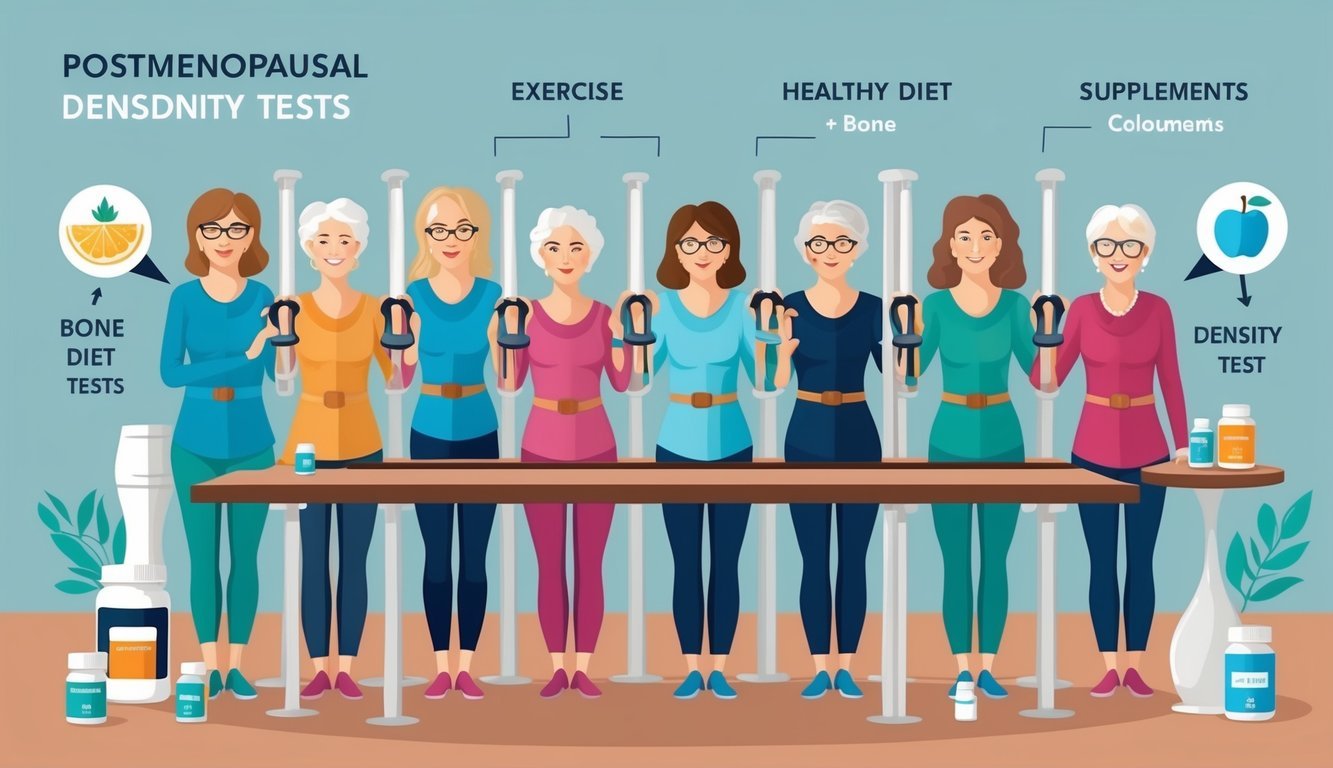
I make it a priority to get regular bone density tests as I navigate postmenopausal health.
These tests help me monitor my bone health and detect any issues early on.
During the test, I lie down on a padded table while a small machine measures my bone density, usually focusing on the hip and spine.
It’s quick and non-invasive.
Receiving my T-score results is crucial.
A score between -1.0 and -2.5 indicates low bone mass, while anything below -2.5 suggests osteoporosis.
This information helps guide my lifestyle and treatment choices.
I learned the importance of avoiding calcium supplements before the test.
This ensures accurate results and helps my healthcare provider assess my bone health effectively.
Regular testing enables me to keep track of changes in my bone density over time.
It’s comforting to know I’m taking charge of my health and reducing the risk of fractures.
Understanding Bone Health
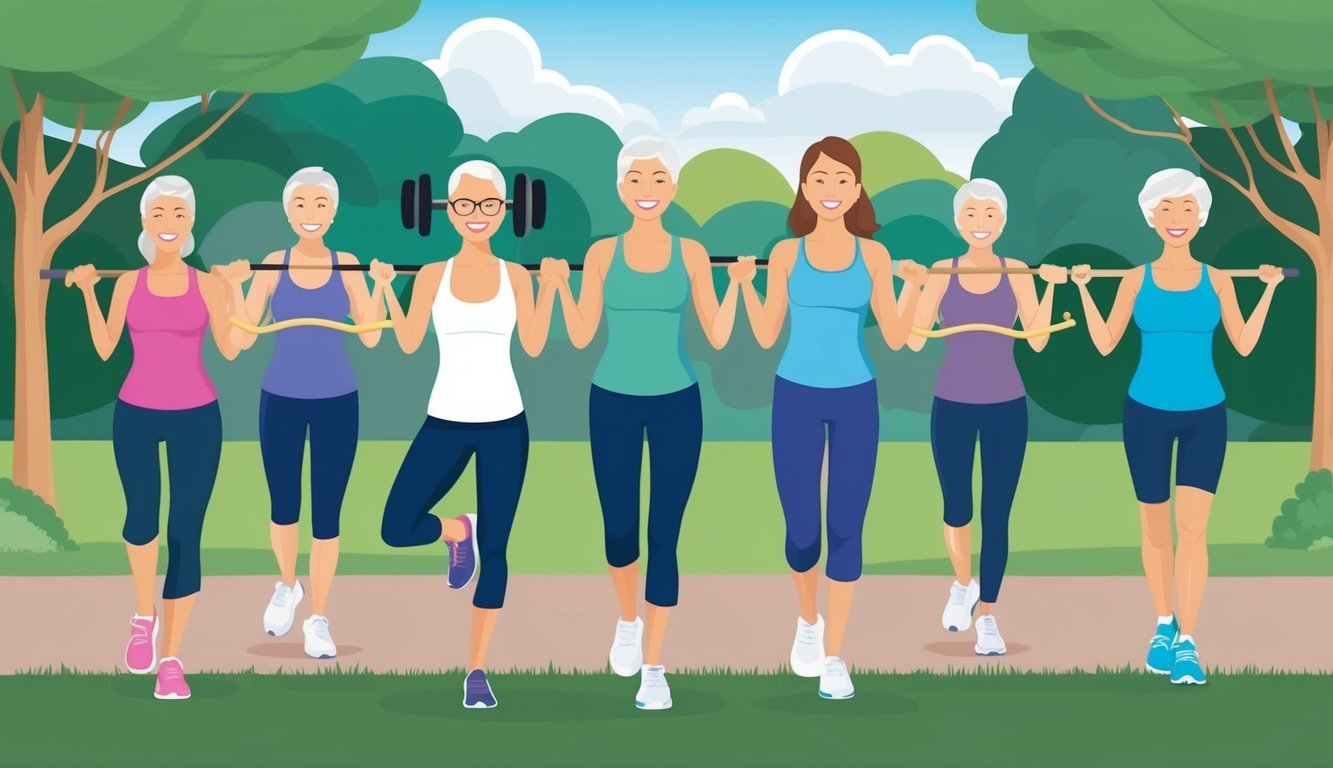
Bone health is crucial, especially for postmenopausal women, as their bodies go through significant changes.
It’s important to grasp the role of bones and how they are affected by menopause to take effective steps in maintaining strong bones.
The Role of Bones in the Body
Bones aren’t just the framework of our bodies; they do so much more! They protect vital organs, store minerals like calcium and phosphorus, and even house bone marrow, where blood cells are made.
Healthy bones support daily movements and overall strength.
Maintaining bone health means keeping this essential system strong.
Engaging in weight-bearing exercises and ensuring I’m consuming enough calcium and vitamin D can help keep my bones resilient.
Additionally, maintaining strong bones can reduce the risk of fractures and osteoporosis as I age.
A balanced diet rich in leafy greens, dairy, and nuts further supports bone density.
Prioritizing bone health today ensures greater mobility and strength in the future.
Bone Density Changes After Menopause
When I hit menopause, significant hormonal shifts occur, particularly a drop in estrogen levels.
This decline can lead to increased bone resorption, meaning my body breaks down bone tissue faster than it can rebuild it.
Studies show that nearly half of postmenopausal women experience some degree of osteoporosis.
This condition weakens bones, making them more susceptible to fractures.
Staying proactive with my bone health is vital.
This includes regular check-ups to monitor bone density and considering treatments like bisphosphonates if necessary.
Keeping informed and taking these steps can make a big difference in my overall bone health.
Dietary Considerations for Bone Health
When it comes to supporting bone health, diet plays a crucial role.
Key nutrients can significantly impact bone density, especially for postmenopausal women.
Here’s what I find important to consider.
Key Nutrients for Strong Bones
Several nutrients are foundational for maintaining strong bones. Calcium is the most well-known, as it forms the core structure of bone.
I aim for a daily intake of around 1,200 mg, which can be achieved through various foods.
Vitamin K supports bone metabolism, and I include leafy greens like kale and spinach in my meals. Magnesium is another essential mineral; foods such as nuts, seeds, and whole grains are excellent sources.
Protein is also vital since it contributes to bone mass.
Incorporating lean meats, legumes, and plant-based proteins like tofu can bolster my intake.
A balanced diet with these nutrients can have a compounding effect on my bone health.
The Importance of Calcium and Vitamin D
Calcium is a powerhouse for bones, but it needs Vitamin D to work effectively.
I make it a point to get enough Vitamin D through sunlight exposure or foods like fatty fish and fortified products.
Without adequate Vitamin D, the body struggles to absorb calcium, which can lead to weaker bones.
Daily supplements might be necessary if I can’t get enough through my diet or sun exposure.
Aim for at least 800 to 1,000 IU of Vitamin D daily.
Combining calcium-rich foods such as dairy or fortified plant milks with a good source of Vitamin D ensures I maximize my bone health.
It’s all about synergy; together, they help keep my bones strong and resilient.

